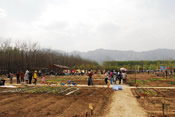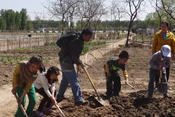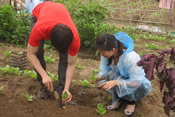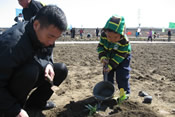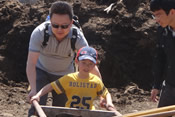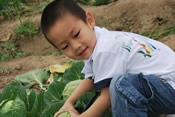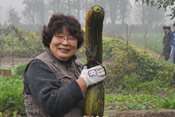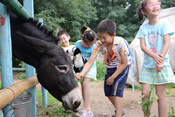By You Hong (Director of Activity Department, Little Donkey Farm in Beijing)
|
Editor’s note: Little Donkey Farm is a public welfare organisation in Beijing that promotes urban farming and encourages citizens to go back to the land. It has set up a farm in a western suburb of the city to encourage citizen participation in ecological agriculture (organic farming) and to practice the life of a 'half-farmer' (a part-time farmer). Through farming, citizens produce food, do exercise, gain inner nourishment, enrich their social lives and build urban-rural relationships. Interested citizens can rent a plot from the farm, and are provided with tools, seeds, water and organic fertiliser as well as technical guidance. PCD has been supporting Little Donkey Farm's internship and public education programmes for many years. You Hong, Director of the farm's Activity Department, explains how urban farming boosts the physical and mental health of people in modern society and looks at the many functions of urban farming from diverse perspectives. |

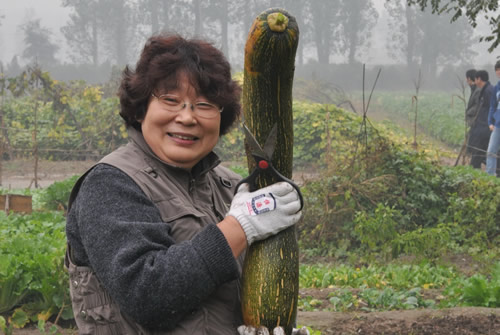 |
| Pride in the harvest. |
In the last few years, it has become trendy in the city for citizens to rent a piece of land in the countryside for farming. This might be due to concerns over food safety. It could also be because the online game of stealing vegetables from QQ Farm does not feel real enough for some people. However, I think it has more to do with the subconscious connection people have with nature and with the land—nearly every person has a pastoral dream. The value of urban farming cannot be measured in economic terms, nor can it be explained in words. Urban farming addresses the needs of human beings and contributes to the development of a more harmonious relationship between people and nature, and people and society.
Physical, Mental and Spiritual Health
By getting along peacefully with nature, our physical, mental and spiritual well-being improves, enabling us to live a healthy life. Agricultural labour provides our bodies with all-round exercise, the body and the mind working together. That is why some people say that agricultural labour is the best way to help us gain wisdom and improve our physical health. In our urban farming, we use neither pesticides nor chemical fertiliser. The food produced is safe for consumption and healthy. The land for urban farming is usually located in the countryside, in a pleasant and serene environment. Appreciating the beautiful scenery, listening to the birdsong and smelling the earthy fragrance of the soil brings contentment. There is no need to be on the defensive, as one would be in the city. One can put away all such thoughts and relax mentally and emotionally. Agricultural labour follows the rhythm of the four seasons. When one observes the continuous cycle of life, one is struck by the miracles and wonders of nature and realises how broad-minded and generous nature is. Heaven and earth “create all things but do not lay claim to them, nurture them but do not lean on them, accomplish goals without claiming credit for it.”[*] As one watches the vegetables and fruits growing robustly in the sun, rain and dew, one realises that without them, human beings could not produce any crop. Recognising the insignificance of human beings and feeling shame at what human beings have done, one cannot but be grateful to Mother Earth.
The Health of Elderly People
Family is the source of harmony between human beings. Many people may be able to lead an army outside of their homes but feel helpless about their relationship with their wives and children. It is not easy to fulfill one’s familial responsibility and keeps one’s family truly happy, but urban farming can help people achieve this. In the farm you often see a whole family, from grandparents to small children, labouring together harmoniously. By renting a plot in the farm, not only can you keep your parents physically healthy, but also make them happy and content. In the city, elderly people often feel unsettled because of emotional isolation in an unfamiliar neighbourhood. Living in a strange environment with high-rise buildings, and shopping in supermarkets for unfamiliar food, they become disorientated. If they could cultivate land in the countryside every weekend, these elderly people would feel contented because they have their children and grandchildren with them and they see the smiles on everyone’s faces. Moreover, in the farm they can chat with other people about farming. In addition, they can harvest safe and delicious food. Whether they have come from the rural area to take care of their grandchildren or they are old city-dwellers who visited rural areas as young intellectuals, they usually have a deep yearning for the land. When farming, they feel steadied and remember happy times from the past. It is noticeable that even though they work outside, exposed to the elements, elderly people appear younger after a few years of farm work on their rented plots. “Our need for farming is rooted in our need to breathe fresh air in the countryside, to do exercise and to chat with friends. It is part of a healthy life that we want to lead. The vegetables that we harvest have become by-products,” said a farmer. His words expressed the charm of urban farming.
Children’s Health
For children, nature is definitely the best teacher. Being able to express their nature in the bosom of Mother Earth will have an impact on their future. Surrounded by steel and cement, many children in the city suffer from 'nature deficit disorder'. Apart from the cabbage seen on their books, children only know the cucumbers in their bowls. They do not know that peanuts grow underground. They point at a zucchini and say that it is a turnip. They have never heard the croaking of a frog… In urban farms, children can spend half a day in a bush. A ditch becomes a battlefield trench for them. They are at ease sitting on a dung cart, talking with insects and watering vegetables. Watching their children at play and in their natural state, adults suddenly realise children do not actually need much. They see that sometimes the way they love their children is wrong and may be doing more harm than good. When they recall their own childhoods, they remember that they did not have any of the toys of today. However their memory of childhood is still filled with joy: playing in the dirt, hopscotching, going wild in the hills and on river banks. The adults then realise how happy they were.
Healthy Social Life
One gains a broader perspective from farming and can develop a more healthy social life. Co-farmers in urban farms come from all walks of life. Chatting about each others’ knowledge and insights, you may reflect on yourself and change your lifestyle. You may carry the joy of weekend farming into your week-day work, transmitting positive energy to your colleagues. You may give the turnips and cabbages that you have harvested to friends as valued gifts. You would also have more experiences to share with your colleagues and friends. If you bring them to the farm every now and then, they will also be influenced by the experience. If your children invite their classmates to the farm, those classmates will be child co-farmers. When more people become co-farmers, it means more people are becoming concerned with food, the land, and ultimately nature, and are joining in to create a harmonious society together.
The impact of urban farming on human beings and on society is all-round, gradual and incremental. It helps people to lead a healthy life. The meaning and value of urban farming is incalculable.
Translator’s notes:
* A line from Dao De Jing by Lao Zi, an ancient Chinese philosopher and the father of Daoism


